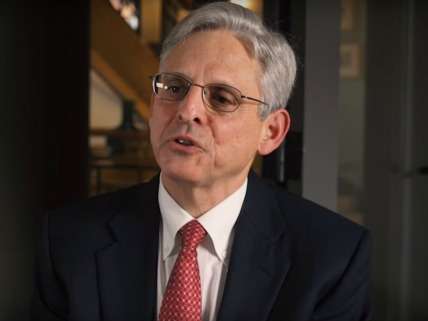Merrick Garland Helped Uphold the DEA's Refusal to Reclassify Marijuana
But the case, which hinged on the DEA's broad statutory discretion, does not say much about the SCOTUS nominee's drug policy views.

Merrick Garland, the Supreme Court nominee whom President Obama announced yesterday, sided with the Drug Enforcement Administration (DEA) a few years ago in a case involving the reclassification of marijuana, a fact that has led to some grumbling among drug policy reformers. But the decision that Garland joined says more about the DEA's broad discretion under the Controlled Substances Act (CSA) than it does about his eagerness to defend pot prohibition.
In 2002 the Coalition to Reschedule Cannabis asked the DEA to move marijuana from Schedule I, the CSA's most restrictive category, to Schedule III, IV, or V. As is its wont, the DEA took its time in responding, finally rejecting the petition in 2011. The petitioners, led by the medical marijuana group Americans for Safe Access (ASA), challenged that decision in federal court, arguing that it violated the Administrative Procedure Act because it was "arbitrary and capricious." A three-judge panel of the U.S. Court of Appeals for the D.C. Circuit disagreed in a 2013 ruling that Merrick joined.
The CSA allows the attorney general to reclassify drugs if he determines that they do not meet the statutory criteria for their current category, an authority that the attorney general has delegated to the DEA. Schedule I is supposedly reserved for drugs with a "high potential for abuse," "no currently accepted medical use," and "a lack of accepted safety," even for use under medical supervision. But the CSA does not define those terms, leaving the DEA wide leeway to decide what they mean.
The ASA case hinged on the meaning of "accepted medical use," which the DEA has defined to require the sort of evidence that the Food and Drug Administration demands before approving a new medicine, including large, double-blind clinical studies. That kind of research is very expensive, and marijuana's Schedule I status, coupled with the federal government's monopoly on producing marijuana for medical studies, makes it harder to do. (The Multidisciplinary Association for Psychedelic Studies is nevertheless trying.) The D.C. Circuit, which in an earlier case had upheld the DEA's definition of "accepted medical use," alluded to the Schedule I double bind in its decision but did not consider that argument, concluding that the issue was not properly raised.
The question for the court was not whether there is evidence of marijuana's medical utility or whether the DEA could have adopted a broader definition of "accepted medical use." The question was whether the DEA's application of its own regulations was "arbitrary and capricious," which is a highly deferential standard. "We will not disturb the decision of an agency that has 'examine[d] the relevant data and articulate[d] a satisfactory explanation for its action, including a rational connection between the facts found and the choice made,'" the D.C. Circuit said, quoting itself. Furthermore, "the agency's interpretation of its own regulations 'must be given controlling weight unless it is plainly erroneous or inconsistent with the regulation.'"
In short, the combination of the broad discretion granted by the CSA and the heavy burden imposed by the Administrative Procedure Act doomed the ASA's challenge, which suffered the same fate as every other attempt to force administrative reclassification of marijuana. I therefore would not read too much into Merrick's position in this case, although it is notable that the man who nominated him likes to pretend this whole body of law does not exist.


Show Comments (24)